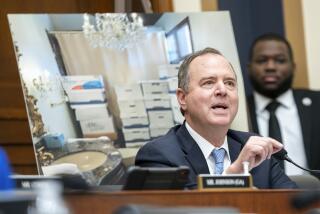Opinion: The trouble with Democrats who are still reliving 2016

As Democratic Party activists try to figure out the right path for 2020, many are being guided by, even haunted by, the legacy of 2016.
I’ve been interviewing political activists in the early primary and caucus states as part of my research project on how party insiders decide on the best direction for their party in the current political environment and settle on a nominee for the next presidential election. In some ways, those activists and party leaders are doing what they usually do — weighing the strengths of the candidates on the issues and trying to figure out who has the best shot of getting elected.
But what’s unusual is how these people who, in many cases, have been volunteering and working in politics for decades, still talk about being traumatized by the 2016 presidential election and how it changed their understanding of politics. That disorientation is playing a central role in whom they’ll choose for 2020.
The lingering effect is twofold. The bitterness of the Democratic primary contest between Hillary Clinton and Bernie Sanders left party activists eager to tamp down divisiveness in this cycle and reluctant to make an early commitment.
One Iowa activist, who has been working on presidential campaigns since the 1980s, said fears of tearing the party apart continue to haunt her and her colleagues. “One of the most negative things out of 2015 and ’16 was the animosity between many of Hillary supporters and many Bernie supporters. People don’t want to pick too early because they don’t want to get sucked into the internecine conflict.”
The other trauma was Hillary Clinton’s loss to Donald Trump despite her consistent polling lead and her strong performances in the debates. The outcome undermined many activists’ longstanding beliefs about just what sorts of candidates are electable.
One Des Moines couple I spoke with have been active in Iowa caucus politics for two decades. For them, the interpretation of 2016 and what were seen as Clinton’s weaknesses have added to the difficulties in picking a favorite candidate this year. According to them, some activists who otherwise would be enthusiastic supporters of Elizabeth Warren or Kamala Harris or Amy Klobuchar are hesitant to commit because they believe that voters have a bias against female candidates. (The couple themselves don’t share these beliefs and claim to have had significant disagreements with friends over this.)
Those other political activists “have convinced themselves that a woman can’t win,” one of them said. “They can no longer say that an African American can’t win, because that happened. But they will say, ‘I just don’t think a woman can win.’”
She expanded on this rationale: “It’s an emotional thing. They’re so traumatized by 2016, and they’re so terrified of revisiting that night and having it all happen again. And I think they like to think that they’re just being practical and a little bit cynical and realistic.” Those fears are leading some activists to support Joe Biden, not because he’s their top preference, but because they think they’re playing it safe.
The trouble with drawing such a conclusion is that it could well be wrong and possibly lead to a misreading of the general electorate in 2020.
There are, of course, a lot of different lessons one can draw from the 2016 election — the Democratic message was flawed, Clinton was a poor candidate, she focused too much on “identity politics,” Russian interference tipped the election, etc. The election results were close enough that almost any of those factors could have made the difference. Who knows what might have shifted 80,000 voters across three states, putting a different person in the White House?
But the idea that women can’t win is not well supported by the research. Female candidates get as many votes as male candidates, as Jennifer Lawless and Danny Hayes found in their study of congressional campaigns, even if party leaders don’t necessarily believe that to be true.
A male Democratic candidate would probably have gotten as many votes as Clinton did in 2016. One of the best predictors of how an election will go is the strength of the economy, and given where the economy was in 2016, political science models expected the Democratic nominee to get about 51% of the two-party vote; Clinton slightly exceeded that. That is, she did better than we should have expected. We have little evidence someone else would have done even better.
One additional point of anxiety activists mention is the high cost of making the wrong choice. A longtime Democratic political consultant told me, “The overriding sense I get from people is that choice matters this time more than in previous caucuses because Trump has raised the stakes.”
Of course, a party making decisions for the next election by interpreting the last one is hardly new. Democrats nominated moderate Southerner Bill Clinton in 1992 in part because of a belief that they lost in the 1980s because they kept picking liberal Northerners. They nominated John Kerry, a decorated veteran, in 2004 in part because they were concerned that previous nominees had looked weak on national defense issues.
The Republican Party’s famous 2012 post-mortem report talked about the kind of candidates they should be nominating in the future based on Mitt Romney’s poor performance among women, Latinos and other underrepresented groups (the party didn’t follow that path in 2016).
Learning from missteps in the last losing campaign can be useful. But looking too much in the rear view mirror risks ignoring what the electorate is looking for in the next election. That’s especially true given the current political crisis with the House moving forward on impeachment — a process that will dominate national politics regardless of the outcome in Congress. In this case, lessons from 2016 may well seem irrelevant come November 2020.
Seth Masket is a professor of political science and director of the Center on American Politics at the University of Denver.
More to Read
A cure for the common opinion
Get thought-provoking perspectives with our weekly newsletter.
You may occasionally receive promotional content from the Los Angeles Times.






